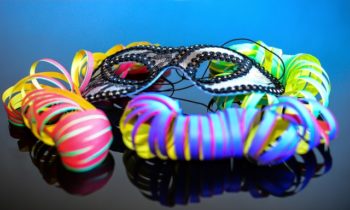Mardi Gras Posted by Tim Hildreth on Feb 16, 2021 in Culture
Today is Fat Tuesday … or as it is more commonly know Mardi gras! Mardi gras in French, of course, literally means ‘fat Tuesday’. While this year’s Mardi gras won’t be the same due to Covid, it’s still a day for celebration.

Mardi Gras
Mardi Gras marks the beginning of the Easter season for Catholics around the world. And while most associate Mardi Gras with the Christian calendar today, it traces its origins back further to pagan celebrations of the new year (which used to coïncide with the arrival of spring in March).
De nos jours1These days, lit. Of our days, Mardi Gras is the culmination of Carnival, a time of feasting and celebration before the start of le carême (période de jeûne et d’austérité qui dure 40 jours)2Lent (period of fasting and austerity lasting 40 days, which begins on le mercredi ces cendres3Ash Wednesday.
Les traditions de Mardi Gras
Mardi Gras is traditionally celebrated with des costumes, des defilés, et des fêtes4costumes, parades, and parties. It’s considered the last chance for fun and frivolity … and to feast … before giving all of that up for le carême.
Mardi Gras is also traditionally celebrated with des crêpes, des beignets, ou des gaufres5crepes, fritters, or waffles or other fried or browned doughs, perhaps historically a chance to use up les oeufs et le beurre6the eggs and butter that would traditionally not be used during Lent.
This video from the French public broadcast service France 24 highlights some other traditions from Dunkirk and Granville … before the pandemic.
Another reason to celebrate
In preparation for les JO7Jeux olympiques/Olympic Games – and as part of the routine maintenance – the Eiffel Tower is getting a makeover! And for the special occasion – and for “un côté un peu plus gold“8an aspect a little bit gold, the tower is going to “retrouver sa couleur jaune/brun de la première moitié du XXe siècle“9rediscover her yellow/brown color of the first half of the 20th century.
Taking anywhere from 15 – 18 months, the Eiffel Tower gets a full new paint job every 5 – 7 years. It helps to keep the tower “fresh” but is also “[une] élément essentiel de la conservation d’un ouvrage métallique“10[an] essential element of the preservation of a work of metal/metallic structure, according to the very man who came up with the tower, Gustave Eiffel.
Interesting fact: la tour Eiffel is not actually the same color all the way up! In order to make it look like one color, the tower is actually painted three different shades of the same color, “[l]a plus sombre … pres du sol [et] la plus claire recouvre les parties les plus hautes“11[t]he darkest … near the ground [and] the lightest covering the highest parts.
Image [CC0] https://www.pexels.com/photo/abstract-art-beautiful-bright-268481/
- 1These days, lit. Of our days
- 2Lent (period of fasting and austerity lasting 40 days
- 3Ash Wednesday
- 4costumes, parades, and parties
- 5crepes, fritters, or waffles
- 6the eggs and butter
- 7
- 8an aspect a little bit gold
- 9rediscover her yellow/brown color of the first half of the 20th century
- 10[an] essential element of the preservation of a work of metal/metallic structure
- 11[t]he darkest … near the ground [and] the lightest covering the highest parts

Build vocabulary, practice pronunciation, and more with Transparent Language Online. Available anytime, anywhere, on any device.



